Wednesday, January 11, 2017
If your Application Materials get you the remote interview, then the Remote Interview gets you the on-campus interview. Which means that the on-campus interview gets you the job. So. Here we are. High pressure. At the 12-20 hour on-campus interview. Smaller schools only do a 12-hour (one day) interview, often including an 8am breakfast, dinner with the search committee, and no breaks. The longer two-day long interviews often have some breaks built in, but may also build in three dinners with various faculty.
So, how does one survive 12-20 hours of interviews?
By packing very carefully.
As always, The Professor Is In has a special post on How To Pack and Dress For Your Campus Visit, which is useful. As is the whole book...
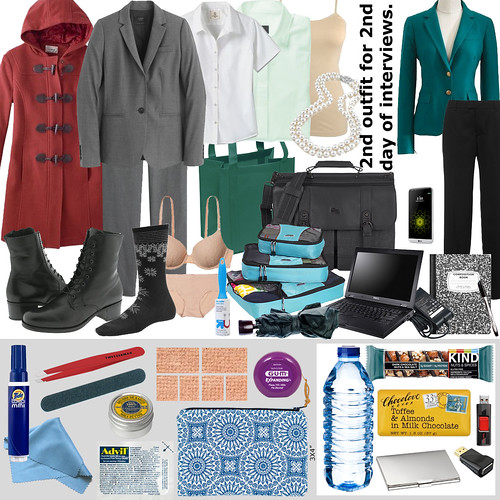
Above is the interview-specific things you need, from the female perspective. I've done a handful of interview trips now, and this is pretty close to my final list.
Clothing
- A suit
- Dress professionally, preferably involving a blazer. I've also been successful with the green blazer + ankle pants separates on the right...and also done a successful job talk in the ankle pants plus a ruffle-front black plaid button-down blouse, no blazer.
- Doesn't have to be expensive, but get that ish tailored (campus visits tend to occur the month after the application deadline).
- I generally avoid skirts during the interview process, because I really don't care to other myself any more than absolutely necessary.
- If there's a second day of interviewing, I pack an entirely different second outfit. If it's just a second dinner meeting, I only pack an extra blouse.
- Button-down shirt to go with the suit
- Nice wool coat
- I love my duffel coat, but a pea coat will work too.
- Reserved jewelry
- La Canadienne Boots (they're waterproof and lined, perfect for walking around New England campuses in January while still looking good).
- The shoes don't have to cost $200, but you get what you pay for. I got a good eBay deal on a pair because they had an unnoticeable blemish.
- Wool Socks (once again, New England winters).
- A clean shirt to wear on the return flight home (may be a back-up button-down shirt)
- A reusable grocery bag
- No, this is not clothing, but it is useful for not being separated from your interview clothing.
- Weather specific items: an umbrella?
- Mini lint roller
- Travel/Entertainment items:
- Kindle, mp3 player, earbuds, knitting, eye mask, scarf, neck pillow, etc.
- Whatever you need to get you through days and days of airports.
- Basic toiletries:
- Face products, Hair products, Teeth products, Nail products, Pharmaceutical products, and whatever else you can fit in two toiletries bags.
- Melatonin and Tylenol PM, if you tend to suffer from poor sleep / anxiety the night before the interview.
- Especially important to bring soap/shampoo if the school is putting you up in a non-hotel, such as a campus guesthouse.
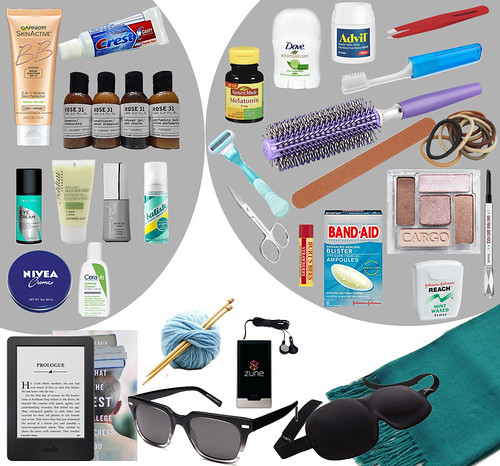
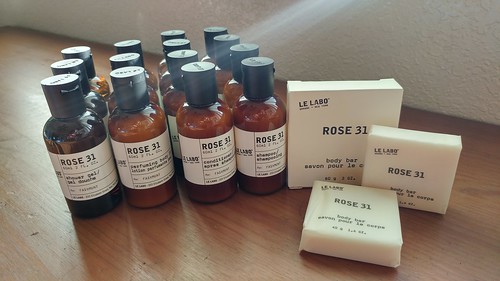
During the Interview
Stuff you need to carry around with you for the 9-20 hours.- A good quality, professional briefcase (leather)
- Laptop + Charger
- Cell phone + Charger
- Notebook/Print-outs with names of everyone you're meeting with and one line about their research (this is not critical at liberal arts colleges). Something you can memorize, or at the very least, read during a bathroom break.
- Projector dongle that converts whatever you have to VGA (you will need it)
- USB Drive with a copy of your talk (and teaching demo, if needed)
- Physiological sustenance: Water bottle, Granola bar, Chocolate bar
- Business cards (although I've never used them)
- "Emergency" 3"X4" Zipper Pouch with things you might need in the middle of the day:
- Tide stain stick mini
- Eye glass cleaner
- Tweezers
- Mini Emery Board
- Chapstick (or Shea Butter for lips + cuticles)
- Advil/Tylenol
- Blister moleskins
- Floss
Transporting a Suit
There's many ways recommended by the Internet about how to do this to prevent wrinkling your suit. I've had decent success with just:- Transport suit on hanger with dry cleaner plastic bag over it.
- Fold suit in half (if your suitcase has a special padded insert for suits, like my goofy one does, then fold it over the padded edge of the insert).
- Place suit in suitcase.
- Upon arrival, hang suit in bathroom and take a steamy shower with the door closed (free suit-steaming!)
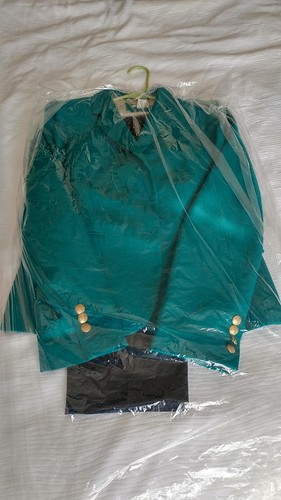
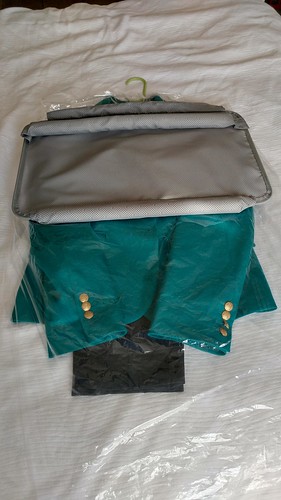
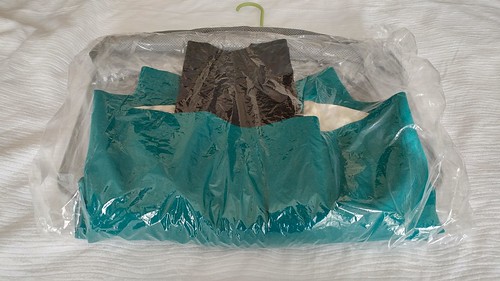
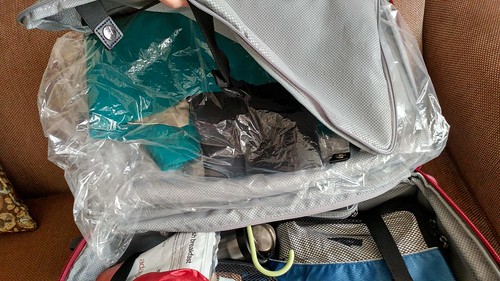
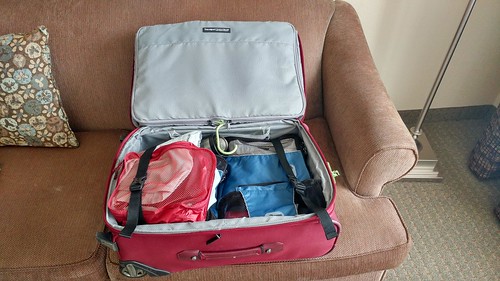
Do Not Get Separated From Your Interview Outfit
There is a green reusable shopping bag included in the pack list, not just because it makes a convenient laundry bag, but also because it helps prevent you from being separated from your suit. Do not let yourself be separated from your interview outfit. Gate-checking your carry-on (where they do not check-through to your final destination, you pick it up at the gate) is fine, and unavoidable with small airplanes. There's a lot of small airplanes involved in this process. Use packing cubes, if possible. When you're boarding a full airplane and they tell you your roller-bag won't fit in the overhead, and it must be checked to the final destination, you:- Take out your reusable grocery bag.
- Remove interview clothing from roller-bag (this is where packing cubes are handy).
- Place clothing/toiletries in reusable grocery bag.
- Check your now-empty roller-bag to its final destination.
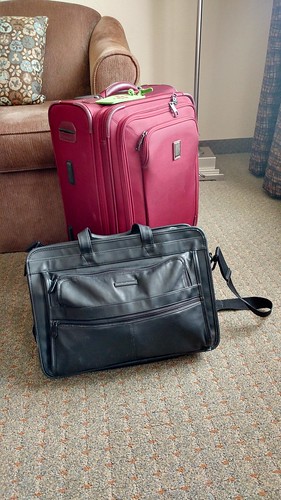
BYOV Posts on the Faculty Job Search
- Overview of the Assistant Professor Job Search
- Applying for Academic Positions
- Remote Interviews
- Packing for On-Campus Interviews
- On-Campus Interview Lessons Learned
- Sample Assistant Professor Job Hunt Timeline
- Reflections on Negotiation
- Descriptive Statistics of my Job Search
- Deciding Research or Liberal Arts






2 comments:
I'm really, really digging your series and I know it's going to help those looking for some help during this exhausting process.
I do want to add that with regard to what you pack, I think people need to pack what they feel professionally comfortable in. I wore a black sheath dress + grey suit jacket for my interviews. I've never felt comfortable in an actual business suit -- regardless of tailoring they've always fit me weird and I felt like I was playing dress up. I think you need to feel as comfortable as possible when on the market, given that most of us don't dress in business professional every day of our lives.
I'd also add a nice portfolio/padfolio. It doesn't have to be super expensive of buttery leather, but having a solid brown or black portfolio that you pull out with notes or questions is a nice representation of being a professional ready to enter into the academic world.
Nicole, these are good points. They don't necessarily work for me, but they may work for others. This post is pretty much a reflection of what works for me, but there's certainly room for other possibilities.
"Dress professionally, preferably involving a blazer" likely covers the dress comfortably professionally. I am not mentally comfortable with a dress/skirt due to the already rather drastic gender differences in academia, but wear what you like, professionally.
From my perspective, the campus visit is largely about a personality fit. I would not recommend doing anything that interrupts eye contact or conversational flow. I also would not recommend doing anything that poses you as a student rather than a peer. For these reasons, I never take notes during these interviews, and I never break out a notebook from which to ask pre-written questions. If you're going to do so, yes, it should be professional, but I'm a bit leery of the perception any such action may intimate.
Post a Comment